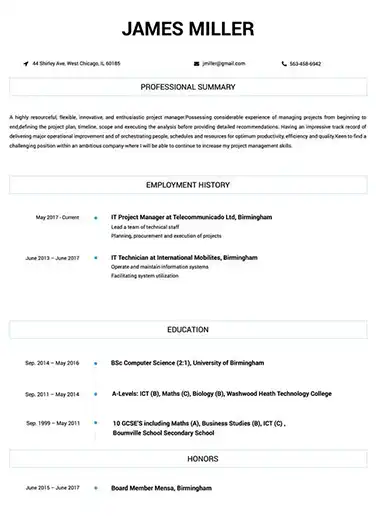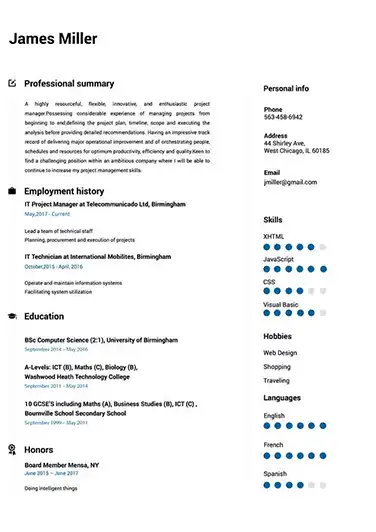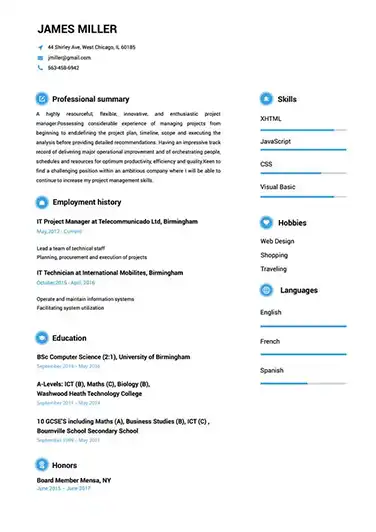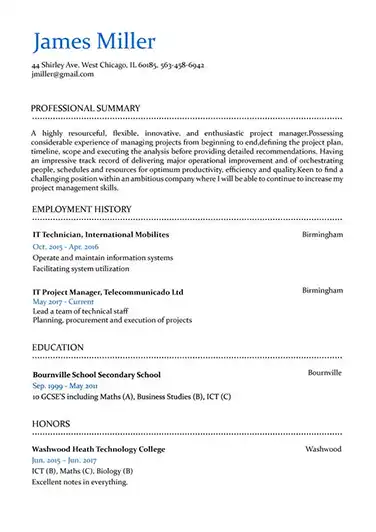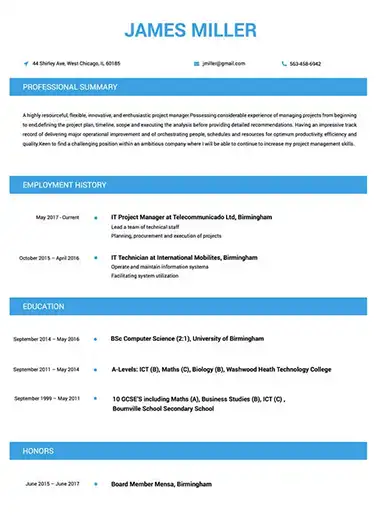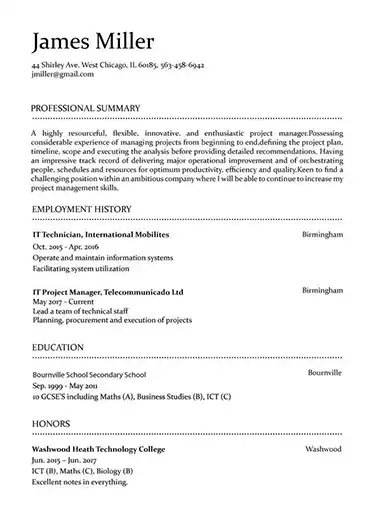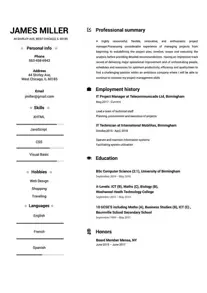 Use This Template
Use This Template
Build your resume in 15 minutes
Create an awesome resume that meets the expectations of potential employers with our selection of professional, field-tested resume templates.
researcher: Resume Samples & Writing Guide
simon-miller@zoho.com
902-308-2086
Employment history
- Analyze and interpret data
- Provide technical support for research projects
- Present research findings to stakeholders
- Develop research protocols
- Prepare grant proposals
- Identify and analyze trends in research data
- Develop research objectives
- Collaborate with other researchers and stakeholders
- Develop research protocols
Education
Skills
Do you already have a resume? Use our PDF converter and edit your resume.
ted.smith@aol.com
876-562-7635
Employment history
- Develop and implement research strategies
- Analyze and interpret data
- Maintain databases of research information
- Maintain databases of research information
- Develop research objectives
- Develop and implement research strategies
- Develop research objectives
- Identify and analyze trends in research data
- Maintain databases of research information
Education
Skills
samjackson@icloud.com
851-358-5393
Professional Summary
Employment history
- Manage research projects
- Analyze and interpret data
- Monitor research progress
- Design and conduct research studies
- Develop and implement research strategies
- Prepare grant proposals
- Develop research objectives
- Develop research protocols
- Provide technical support for research projects
Education
Skills
turner.kyle@aol.com
812-872-9989
Employment history
- Prepare research reports and presentations
- Identify and analyze trends in research data
- Design and conduct research studies
- Develop and implement research strategies
- Prepare research reports and presentations
- Present research findings to stakeholders
- Develop research objectives
- Prepare grant proposals
- Collaborate with other researchers and stakeholders
Education
Skills
evanssimon@yahoo.com
960-360-6019
Professional Summary
Employment history
- Maintain databases of research information
- Manage research projects
- Prepare research reports and presentations
- Develop and implement research strategies
- Prepare grant proposals
- Maintain databases of research information
- Analyze and interpret data
- Manage research projects
- Develop research protocols
Education
Skills
Not in love with this template? Browse our full library of resume templates
There’s no getting around the fact that researchers aren’t always great at being concise. It’s easy to get used to academic writing style. In particular, writing like you have a captive audience you know are interested in all of the details of your work. However, when applying for a research position you can’t make that assumption.
Sure, there’s a good chance an expert will give your resume a look-through at some point, but your main audience is not likely to be an expert in your field. You need to carefully consider who that audience will be and ensure your resume is written for them.
Before you start worrying, this guide is designed to help you do just that. We’ll be pulling experience from researchers and professional resume writers to ensure you can balance both for the perfect researcher resume.
What this guide will show you:
- How to analyze researcher resume examples for inspiration
- What you need to know about ATS
- How to appeal to recruiters
- The best formatting rules to follow
- How to list your education more effectively
- What will make your achievements stand out
- The best qualifications to include
- How and why to begin with an objective or summary
- The best hard and soft skills to add
- How to target your resume for a specific position
- How to use a resume builder to get better results
Research resume template examples
Imagine writing a research proposal without ever having seen one. It’s anxiety provoking just thinking about it. But why then do so many researchers simply throw all of their information on a resume and start submitting it without studying what their resume could and should look like first?
To get better results, you need to take creating your resume seriously. That requires beginning by taking inspiration (and notes) on top quality researcher resume examples. Have a look at the samples we’ve provided below and note what you like and don’t like about them. Those notes can then serve as a starting point for your own resume. Also be sure to evaluate them from the perspective of someone looking to hire them and not as a fellow researcher.
[Examples]
How to write a researcher resume that will get your phone ringing
For many researchers, submitting proposals and resumes for positions can get fairly routine. You may occasionally update your resume and tailor things for a specific position, but you’re likely doing it often enough that you’ve stopped thinking hard about the details.
Time to change that.
By writing a resume that clearly considers the person reading it and gets all the critical details right you’ll be increasing your chance of landing the research position you really want. Trust us, it’s worth the extra time and effort. But where should you start?
What you need to know about ATS
ATS stands for Applicant Tracking Systems. These are tools created by dozens of different companies which allow recruiters to sort through huge numbers of resumes at scale using artificial intelligence. While these systems are less likely to be used for researcher resumes, if you’re applying at a large company for, say a pharmaceutical research position, there’s a decent chance your resume will encounter one.
Unless you’re very familiar with how the organization you’re looking to work for hires researchers, you need to be ready for ATS. After all, most companies already use it and that number is only increasing. But what does being ATS ready entail? We’ve boiled it down to these three key points:
- Only submit your resume as a .doc, .docx, or .pdf file. Anything else won’t be able to be easily read by an ATS and will almost certainly get rejected.
- Use a resume builder to ensure your file is ATS-friendly. Sadly, not all of these files are created equal, the way the data is structured within the file has an enormous impact on whether an ATS can easily read it. But don’t worry, no need to get too technical, just be sure you use a resume builder which has been designed to produce ATS-optimized files.
- Get smart with how you use keywords. Remember, ATS are smart but not that smart. They’re given a set of keywords, skills, experience, etc. to look for on your resume. If you’ve phrased your skills differently, the ATS might not realize what you mean. That’s why it’s critical to use the description of the researcher position as a guide for which keywords to include and how to phrase them. This maximizes the chance an ATS gives your resume the go-ahead to move on to a human reviewer.
How to give recruiters what they’re looking for
If you’ve ever been in an academic lecture where the lecturer clearly doesn’t care that the information and way they’re presenting aren’t connecting with the audience, you know what it feels like to be a recruiter. Most resumes don’t take a moment to think about the person reading them and what they need from the resume.
This means that by considering the person reading your resume, you can have a substantial leg up. Once again, this begins with the description of the research position. Instead of using a generic resume for each application, customize your resume to fit one position, making it easy for the person reading it to say “yes” to hiring you (more on how to do that later).
Also consider whether the person reading your resume is a specialist in your field or not. This should affect the language you use. It should be easy for them to read and understand everything on your resume. The easier it is, the more grateful they will be for the time and effort you’ve saved them.
How to format your resume
The next most important way to appeal to the reader of your resume is with proper formatting. The core rule is to put the most important information towards the top. This seems obvious but you’d be surprised how often it gets ignored. This is why your resume should begin with an objective or summary with the most important information about you as a researcher (more details on how to write those below).
Then, your content should be in reverse chronological order. But beyond those simple rules, you also need to consider the ideal length for a researcher resume. This will vary a lot based on your experience and the norms in your specific research area. However, there is one rule of thumb you should follow: make your resume as short as it can be. The person reading it doesn’t want their time wasted, so taking a critical look and cutting unnecessary sections and information will be a welcome change for them.
The best sections to consider including on a researcher resume
- Resume objective or summary
- Research experience
- Achievements
- Projects
- Education
- Hard skills
- Soft Skills
What makes a great researcher resume?
A great researcher resume is tailored. After all, a resume applying for a basic research position and one applying for a position researching something specific like the cure to a disease should be completely different. Getting this right begins with understanding the needs of the people who will be hiring you and showing that you can meet those needs.
What to include in your education section
Most resumes waste too much time on their education when it’s not relevant, but obviously a research resume is different. You’ll be expected to provide details. However, the way you present those details is still important.
MA in Political Science
The University of Virginia
2016-2018
-My thesis focused on how the 2009 financial crisis effected rural voters in Iowa, it found a .82 R value correlation between deceased economic activity and decreased voter participation.
-I worked on a variety of projects with professors
-I took courses focusing on rural politics
First, the choice is mentioning the R value is a bit odd. If your thesis is relevant enough to go into that detail it probably deserves its own mini section. Describing it in a single sentence while also going into details like that strikes and odd balance. The next two points listed are simply too vague and so they ultimately waste space and raise more questions than they answer. The incorrect use of “effect” vs “affect” also does not look good. This is one reason why it makes sense to have a friend (hopefully one in your field) review your resume before you send it off.
Let’s look at an improved version.
MA in Political Science
The University of Virginia
2016-2018
-Thesis title “The Economics of Rural Voter Participation, an Examination of the Effect of the 2009 Crisis on Rural Iowa.”
-Worked with Professor Alan Rao on his field research studying the relationship of Midwestern farmers to state and federal authorities.
-Focused on quantitative methods and statistical analysis
Here the thesis title is given, which if you’re only going to include a single point of information is generally the most important thing to mention. Otherwise the details focus on what this person did during their MA which might be directly relevant to research, who they worked with, what they worked on, and the skills they developed.
In general, the most recent and relevant a degree is to your work the more detail you can and should include. If you obtained your BS 15 years ago, you can mention it but it’s not worth going into too many details unless, for example, you worked with a famous researcher in your field.
How to highlight your most important achievements
Most academic resumes can be a bit vague about what they’ve achieved in their work. That’s why highlighting your achievements is one of the best ways to make your researcher resume stand out. Now these don’t just have to be achievements directly connected to the results of your previous research. After all, a researcher needs to be organized, diligent, a good communicator, etc. These are all skills you can emphasize by mentioning achievements.
Let’s look at an example to see what this might look like.
-Improved quantitative research methods while working as a marketing manager at Imbue Technologies.
While this achievement example is close to working, it ultimately doesn’t because it lacks any specifics. What does improving quantitative research methods mean? Were there any results from this? Let’s see another example where details make the difference.
-Developed a system for tracking and optimizing temperature, flow rate, and ratios for coffee as a manager at Hyperion Coffee, leading to a 14% increase in customer satisfaction with the coffee quality.
Chances are this person isn’t applying to be a coffee researcher, but this example shows a few key things. Number one, it demonstrates that they’re proactive and will look for ways to improve processes. Next, it shows a love of delving into the complex relationship between small details to get better overall results, another nice quality for most researchers. In other words, this workplace example is actually great to mention on a researcher resume.
What are ideal researcher job qualifications and how to list them correctly
In most cases, the main criteria you’ll need to focus on in your resume will be:
- Relevant degrees
- Knowledge of and experience with relevant research methodologies
- Experience in the research process
- Statistical methods
- Relevant technical software or tools
- Written and oral communication
Of course these will vary whether you’re a nuclear physicist or a political scientist. Whatever the most important qualifications are for your specific area of research, you need to ensure they are clearly visible on your resume. The person reading it shouldn’t be searching around to determine whether or not you meet the minimum criteria for the position.
How to list your skills more effectively
While listing the right skills is critical for getting past ATS, including concrete examples which demonstrate those skills is going to leave a far bigger impression on the humans reading your resume. While this isn’t as typical for most academics (frustrations with teaching evaluations aside), the role of a researcher is more results based and so this approach works well.
Data entry
Listing a skill like this isn’t inherently bad, but can be substantially improved with an example.
Data Entry
-Inputted over 10,000 data points as a research assistant with Professor Compton
Here a simple example means that the reader will get a far better sense of what that skill means and how confident they can be in it. This also demonstrates that you're going out of your way to make their job easier by eliminating the need for them to stop and consider what that skill means in your case.
The best hard skills to include
While the specific skills required will vary tremendously for different research roles, these are some of the core skills you’ll want to include if possible:
- Statistical methods
- Data entry
- Experience with relevant equipment used
- Database management
- IRB experience
- Writing grant applications
The best soft skills to include
- Curiosity
- Patience
- Working well under pressure
- Adaptability
- Passion for the field
- Commitment to and knowledge of ethical standards in the field
Why your resume should start with an objective or summary
Think of an objective or summary as a shortened version of an abstract. They should get across the most important information right from the start and help frame the more detailed information presented in the rest of the resume.
The difference between them is primarily about length. A resume objective should only be about one sentence and is ideal when you just want to list a few key bits of information about you and your goals. A resume summary is longer and better when there’s something you want to explain like your motivation for applying to this research position.
How to write a resume objective
Your objective needs to be clear, concise, and information dense. Let’s examine two examples to see what that should (and shouldn’t) look like.
I’m a recent graduate from UCLA’s Microbiology Masters program looking for a summer research position.
This example makes the obvious mistake of being written in the first person instead of the third, but more importantly it simply gives basic information which is easily available elsewhere on the resume. It’s relevant information, but this is extremely valuable space on your resume and should be used to greater effect.
Recent MS graduate looking to apply human microbiome research experience towards a position at AR Food Tech.
There you have a simple and straightforward resume objective. It gives the essential information about who you are and what you aim to achieve. The university you graduated from, for example, isn’t worth mentioning here, though the fact that this person is a recent graduate is.
How to write a resume summary
The thing to remember about a resume summary is that, like a research paper, just because it can be long doesn’t mean it should be. You still need to be careful and deliberate with the information you choose to include.
Experienced food chemistry researcher who has worked at industry-leading brands developing artificial colors, preservatives, flavor compounds, etc. Familiar with lab equipment and experimental techniques. Always looking for new ways to push teams to the cutting edge of food science.
What doesn’t work about this example is the information it chose to include and thereby emphasize along with its lack of detail. After reading this summary, instead of thinking “they sound impressive” a recruiter would likely be thinking “how many years of experience? Which industry-leading brands? Why did you mention familiarity with basics like lab equipment and experimental techniques?”
Your resume summary should create a strong impression and not simply raise more questions. So let’s see an improved version of this example to better understand what that should look like.
Food chemistry researcher with 8 years of lab experience with Nestle, Pepsico, and General Mills largely focused around preservatives and artificial flavor development. Looking to take industry-leading knowledge of experimental techniques and lab management to help Advanced Snax challenge industry leaders.
This example contains much of the same information, but frames it around a mission. That framing means that the recruiter won’t see hiring this person as simply getting another researcher, but as gaining a valuable team member to help the company achieve its goals. By framing their work in this large context, this resume summary will certainly stand out.
How to target your resume for each application
As we’ve alluded to throughout this guide, one of the most effective ways to improve a researcher resume is to target it to a specific position. Creating a single resume for yourself and sending it out to many researcher roles saves time and it shows. It does not make you look diligent, detail oriented, or that you care enough to put in the time and effort to do something right.
The best way to go about targeting your resume is to begin with the keyword technique mentioned in the beginning of this guide. Then, employ your research skills. Look at the organization which will be hiring you, what are their needs, their goals, what problems might they be having with their research? Once those have been identified, identify and emphasize how you can help them address those needs. After all, hiring another researcher is great, but hiring a person who can solve a specific problem or improve a bad process is far more enticing for most organizations.
Lastly, mentioning the organization or the role in your resume objective or summary works well to quickly indicate to the person reading it that you’ve taken the time to customize your resume, thereby making a stronger first impression.
How to make your resume stand out
Besides all of the tips mentioned so far in this guide, the final piece to the puzzle of a standout resume is the visual design. A clean modern design on your resume does a couple of things. First, it shows that you took the time to do a good job. Next, it’s easier on the eyes of the poor person who needs to review dozens of resumes for a researcher position.
Finally, it communicates that you’re not content doing things the same way they’ve always been done. If you’re a young and ambitious researcher, it’s an aesthetic which reinforces your core qualities in subtle but powerful ways. But if you’re not a designer, how can you get that design?
The importance of using a resume builder
Obviously, you’ve got a lot on your plate when it comes to creating the best possible researcher resume. That’s why it makes sense to use the right tools to take some of that pressure off. A resume builder allows you to be confident that your resume will be ready for ATS, makes it easy to get a clean and modern look, and helps in organizing all the custom versions of your resume for various researcher roles.
Resumebuild.com’s powerful but intuitive builder has been designed from the ground up to help you with all of these needs and more. It takes care of the technical and design challenges so you can focus your attention where it will have the most impact: on the content.
researcher Job Descriptions; Explained
If you're applying for an researcher position, it's important to tailor your resume to the specific job requirements in order to differentiate yourself from other candidates. Including accurate and relevant information that directly aligns with the job description can greatly increase your chances of securing an interview with potential employers.
When crafting your resume, be sure to use action verbs and a clear, concise format to highlight your relevant skills and experience. Remember, the job description is your first opportunity to make an impression on recruiters, so pay close attention to the details and make sure you're presenting yourself in the best possible light.
researcher
- Conduct research or assist in the conduct of research, including the collection of information and samples, such as blood, water, soil, plants and animals.
- Isolate, identify and prepare specimens for examination.
- Collect and analyze biological data about relationships among and between organisms and their environment.
- Supervise biological technicians and technologists and other scientists.
- Program and use computers to store, process and analyze data.
- Prepare technical and research reports such as environmental impact reports, and communicate the results to individuals in industry, government, or the general public.
- Teach, supervise students and perform research at universities and colleges.
junior researcher
- Research, compile, and prepare reports, manuals, correspondence, or other information about democratic and political factors world wide required by IDEA, governmental agencies and other non-governmental Agencies.
- Develop or update procedures, policies, and primers (see publications).
- Consult with programme managers or other personnel to resolve problems or improve certain processes within project areas.
- Organize and coordinate different conferences.
researcher
- Measure salinity, acidity, light, oxygen content, and other physical conditions of water to determine their relationship to aquatic life.
- Communicate test results to state and federal representatives and general public.
- Research environmental effects of present and potential uses of land and water areas, determining methods of improving environmental conditions or such outputs as crop yields.
- Represent employer in a technical capacity at conferences.
researcher
- Studied the effects of artificial sweeteners.
- Taught, supervised, and trained students to perform research at California State University Long Beach
- Prepared charts and graphs from data samples, providing summary information on the relevance of the data.
- Develop methods and apparatus for securing representative plant, animal, aquatic, or soil samples.
researcher
- The Thesis Title of Research was ” Noise Pollution Survey In Textile Industry of Faisalabad and It’s Health Effects on Workers”.
- The objective of conducting of survey in Textile Industry in Faisalabad was to assess harmful effects on workers Psychologically and Physically Health.
- The Research was Carried in Three Selected Zones ( Rasheedabad Jhang Road, Sadhar Bypass Jhang Road and Small Industrial Estate Sargodha Road) Faisalabad in 9 Power Looms Units.
- Conduct standardized biological, microbiological or biochemical tests and laboratory analyses to evaluate the quantity or quality of physical or chemical substances in food or other products.
researcher Job Skills
For an researcher position, your job skills are a key factor in demonstrating your value to the company and showing recruiters that you're the ight fit for the role. It's important to be specific when highlighting your skills and ensure that they are directly aligned with the job requirements, as this can greatly improve your chances of being hired. By showcasing your relevant skills and experience, you can make a compelling case for why you're the best candidate for the job.
How to include technical skills in your resume:
Technical skills are a set of specialized abilities and knowledge required to perform a particular job
effectively. Some examples of technical skills are data analysis, project management, software proficiency,
and programming languages, to name a few.
Add the technical skills that will get hired in your career
field with our simple-to-use resume builder. Select your desired resume template, once you reach the skills
section of the builder, manually write in the skill or simply click on "Add more skills". This will
automatically generate the best skills for your career field, choose your skill level, and hit "Save &
Next."
- Data Mining
- Statistical Analysis
- Data Visualization
- Machine Learning
- Programming
- Software Development
- Algorithm Design
- Data Structures
- Data Modeling
- Data Warehousing
- Natural Language Processing
- Simulation
- Database Design
- Cloud Computing
- Big Data
- Data Security
- Artificial Intelligence
- Image Processing
- Programming Languages
- Data Analysis.
How to include soft skills in your resume:
Soft skills are non-technical skills that relate to how you work and that can be used in any job. Including
soft skills such as time management, creative thinking, teamwork, and conflict resolution demonstrate your
problem-solving abilities and show that you navigate challenges and changes in the workplace
efficiently.
Add competitive soft skills to make your resume stand-out to recruiters! Simply select
your preferred resume template in the skills section, enter the skills manually or use the "Add more skills"
option. Our resume builder will generate the most relevant soft skills for your career path. Choose your
proficiency level for each skill, and then click "Save & Next" to proceed to the next section.
- Communication
- Interpersonal
- Leadership
- Time Management
- Problem Solving
- Decision Making
- Critical Thinking
- Creativity
- Adaptability
- Teamwork
- Organization
- Planning
- Public Speaking
- Negotiation
- Conflict Resolution
- Research
- Analytical
- Attention to Detail
- Self-Motivation
- Stress Management
- Collaboration
- Coaching
- Mentoring
- Listening
- Networking
- Strategic Thinking
- Negotiation
- Emotional Intelligence
- Adaptability
- Flexibility
- Reliability
- Professionalism
- Computer Literacy
- Technical
- Data Analysis
- Project Management
- Customer Service
- Presentation
- Written Communication
- Social Media
- Troubleshooting
- Quality Assurance
- Collaboration
- Supervisory
- Risk Management
- Database Management
- Training
- Innovation
- Documentation
- Accounting
- Financial Management
- Visualization
- Reporting
- Business Acumen
- Process Improvement
- Documentation
- Relationship Management.
How to Improve Your researcher Resume
Navigating resume pitfalls can mean the difference between landing an interview or not. Missing job descriptions or unexplained work history gaps can cause recruiters to hesitate. Let's not even talk about the impact of bad grammar, and forgetting your contact info could leave your potential employer hanging. Aim to be comprehensive, concise, and accurate.
Employment history
- Identify and analyze trends in research data
- Manage research projects
- Prepare research reports and presentations
- Maintain databases of research information
- Prepare research reports and presentations
- Monitor research progress
Education
Skills
Include your Contact Information and Job Descriptions
Missing job descriptions lessens your chances of getting hired.
Key Insights- Employers want to know what you've accomplished, so make sure to include descriptions for all of your previous jobs.
- Keep job descriptions short but don't just list your jobs.
- Never copy-paste a job description to post on your resume. Get inspired and use tools to help you write customized descriptions.
How to Optimize Your researcher Resume
Keep an eye out for these resume traps. Neglecting to detail your job roles or explain gaps in your career can lead to unnecessary doubts. Grammar blunders can reflect negatively on you, and without contact information, how can employers reach you? Be meticulous and complete.
roy.evans@yahoo.com
841-259-7970
Employment history
- Manage researchs projects
- Prepares researchs reports and presentationss
- Provide technicals supports for researchs projects
- Manage reserch projects
- Provide technicall support for reserch projects
- Moniter research progress
- Maintain databases of research informations
- Review and edits research documents
- Analyze and interprets data
Education
Skills
Correct Grammar and Address Gap Years in Your Resume
Don't leave unexplained gaps in your work history.
Key Insights- When explaining gaps in your employment section, start by being honest.
- Elaborate on the gap and show that you never stopped learning.
- Explain and elaborate any gap in your work history by highlighting new skills.
researcher Cover Letter Example
A cover letter can be a valuable addition to your job application when applying for an researcher position. Cover letters provide a concise summary of your qualifications, skills, and experience, also it also gives you an opportunity to explain why you're the best fit for the job. Crafting a cover letter that showcases your relevant experience and enthusiasm for the Accounts Payable role can significantly improve your chances of securing an interview.
Miller simon-miller@zoho.com
902-308-2086
470 River Road, Elmer, OK
73539
University of California
Berkeley, California
Esteemed University of California Hiring Team
I am excited to apply for the Senior Researcher role at University of California. As a highly skilled Researcher, I am confident that I have the necessary experience and abilities to make a valuable contribution to your organization.
Throughout my life, I have pursued my passion for Problem Solving and have gained experience in this field as a result. This experience has given me valuable skills such as Presentation and Flexibility, which I am excited to bring to this position. I am eager to work with a team that shares my enthusiasm as a Researcher and help your organization achieve its well determined goals.
I am elated about the opportunity to join a team that shares my passion for this field, and values collaboration and innovation. I am confident that together we can overcome whatever tests and challenges are put on our way.
Best regards,
Simon Miller
902-308-2086
simon-miller@zoho.com
Simon Miller
Showcase your most significant accomplishments and qualifications with this cover
letter.
Personalize this cover letter in just few minutes with our user-friendly tool!
Related Resumes & Cover Letters

Build your Resume in 15 minutes
Create an awesome resume that meets the expectations of potential employers with our selection of professional, field-tested resume templates.

